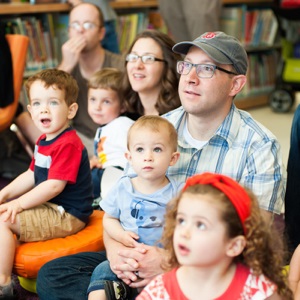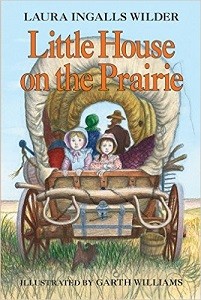
Welcome to the Horn Book's Family Reading blog, a place devoted to offering children's book recommendations and advice about the whats and whens and whos and hows of sharing books in the home. Find us on Twitter @HornBook and on Facebook at Facebook.com/TheHornBook
Revisiting Childhood Friends
 The author's husband and son listen to a story at the 2015 Hubbub festival. Photo: Mike Ritter
The author's husband and son listen to a story at the 2015 Hubbub festival. Photo: Mike RitterMy son was about three months old when it happened. I was reading to him before bedtime, with my husband nodding off (or so I thought) on the couch next to us. Then, out of the blue: “That’s a little creepy, isn’t it? 'Goodnight nobody'?” Story time derailed, I proceeded to argue passionately against the many critiques my husband leveled, from that enigmatic old lady to the unappealing, rapidly chilling mush. It wasn’t until later, during one of many pre-dawn feedings, that I took time to wonder why my husband’s critical takedown of Goodnight Moon had seemed like such a fundamental assault, not only on my choice of newborn reading material but almost, it seemed, on my sense of self.
My husband is one of the most well-read people I know, and since most of my reading material nowadays consists of recent fiction for kids, teens, and adults, he certainly reads more broadly than I do. But as the daughter of a librarian and a professor, I had a childhood defined by weekly trips to the library, a close friendship with our children’s librarian, and countless beloved children’s books and characters. My husband’s childhood memories, by contrast, are characterized by television shows and, later, by the comic books he devoured until he felt ready to take a bite out of the adult fiction and history sections.
So he’s coming to many of the classic picture books—from Ferdinand to Make Way for Ducklings to The Snowy Day—only now, as an adult, unencumbered by the weight of memory and nostalgia they hold for me. Most of the time, it’s purely delightful to watch my husband and son (now three) meet some of my old friends (Frances, Max, Frog and Toad, George and Martha) together for the first time. But, without that fuzzy lens of nostalgia, without those hazy once-upon-a-time memories of being read The Little Engine that Could or Katy and the Big Snow, he’s much more ready (and able) to point out any weaknesses, shortcomings that, without his critical distance, I would probably remain largely oblivious to.
 It’s not surprising that when we return as adults to books we loved as children, we notice new things, some of which might tarnish that nostalgic sheen. The problematic elements of the Little House books for modern readers have been well documented (Pa’s blackface! Laura’s papoose! Ma and the Native Americans!), and Laura Miller wrote a whole book about rereading the Chronicles of Narnia. Even now, I can grudgingly admit that Anne of Green Gables is a little long on flowery descriptions of PEI and a little short on realistic dialogue. But these are revelations I’ve come to on my own terms, sometimes hard-won. Having criticisms—even well-reasoned, well-supported ones—leveled at the beloved books of my youth can feel a little like showing your childhood photo albums to a significant other and having him point out your green corduroy pants or hairspray-stiffened bangs or plaid sofa as (sometimes ugly) relics of another time instead of essential threads in the fabric of memory.
It’s not surprising that when we return as adults to books we loved as children, we notice new things, some of which might tarnish that nostalgic sheen. The problematic elements of the Little House books for modern readers have been well documented (Pa’s blackface! Laura’s papoose! Ma and the Native Americans!), and Laura Miller wrote a whole book about rereading the Chronicles of Narnia. Even now, I can grudgingly admit that Anne of Green Gables is a little long on flowery descriptions of PEI and a little short on realistic dialogue. But these are revelations I’ve come to on my own terms, sometimes hard-won. Having criticisms—even well-reasoned, well-supported ones—leveled at the beloved books of my youth can feel a little like showing your childhood photo albums to a significant other and having him point out your green corduroy pants or hairspray-stiffened bangs or plaid sofa as (sometimes ugly) relics of another time instead of essential threads in the fabric of memory.Unlike my one-time attachment to Aqua Net, however, I’m not yet ready to part with the literary tastes of my youth, which is why I’ll continue to seek out old favorites at our local library and read them with my son, along with classics in the making I discover by reading review journals and blogs. Combined with my husband and son’s more serendipitous approach to the library shelves, I like to think that our family reading represents best possible blend of the new and the familiar (at least to me), even as I’m continually being challenged by my husband to look at those old favorites through a different, more critical lens. I often wonder which books and characters will stick with my son and remain vivid in his memory years or even decades from now. Perhaps someday he, too, will have the opportunity to encounter these old friends again not only with fondness and familiarity but also with fresh eyes.
For more on revisiting childhood stories, read Katie Bircher's blog post: Another Look at a "Second Look"; Decolonizing Nostalgia: When Historical Fiction Betrays Readers of Color; and Zetta Elliott's The Writer's Page: Decolonizing Imagination from 2010.
ALREADY A SUBSCRIBER? LOG IN
We are currently offering this content for free. Sign up now to activate your personal profile, where you can save articles for future viewing.






Add Comment :-
Be the first reader to comment.
Comment Policy:
Comment should not be empty !!!